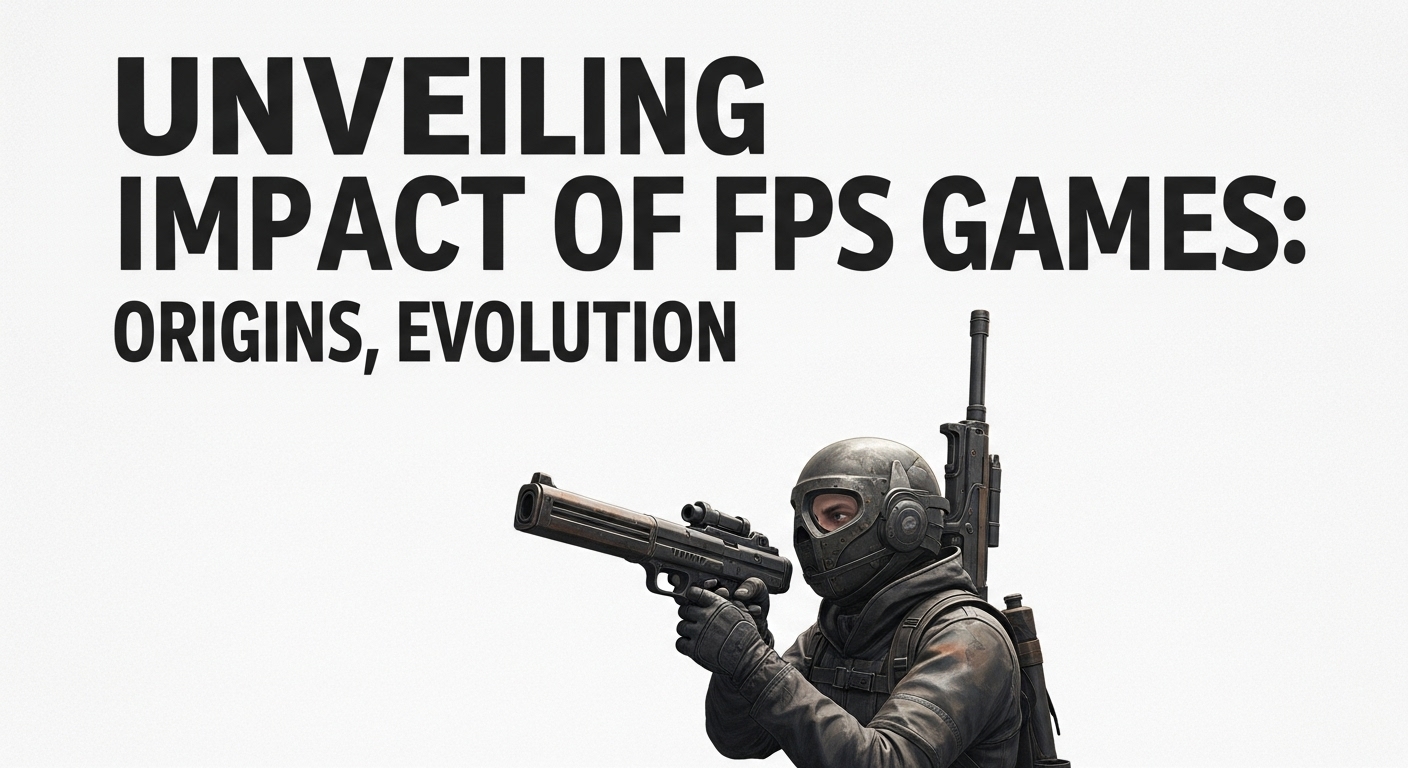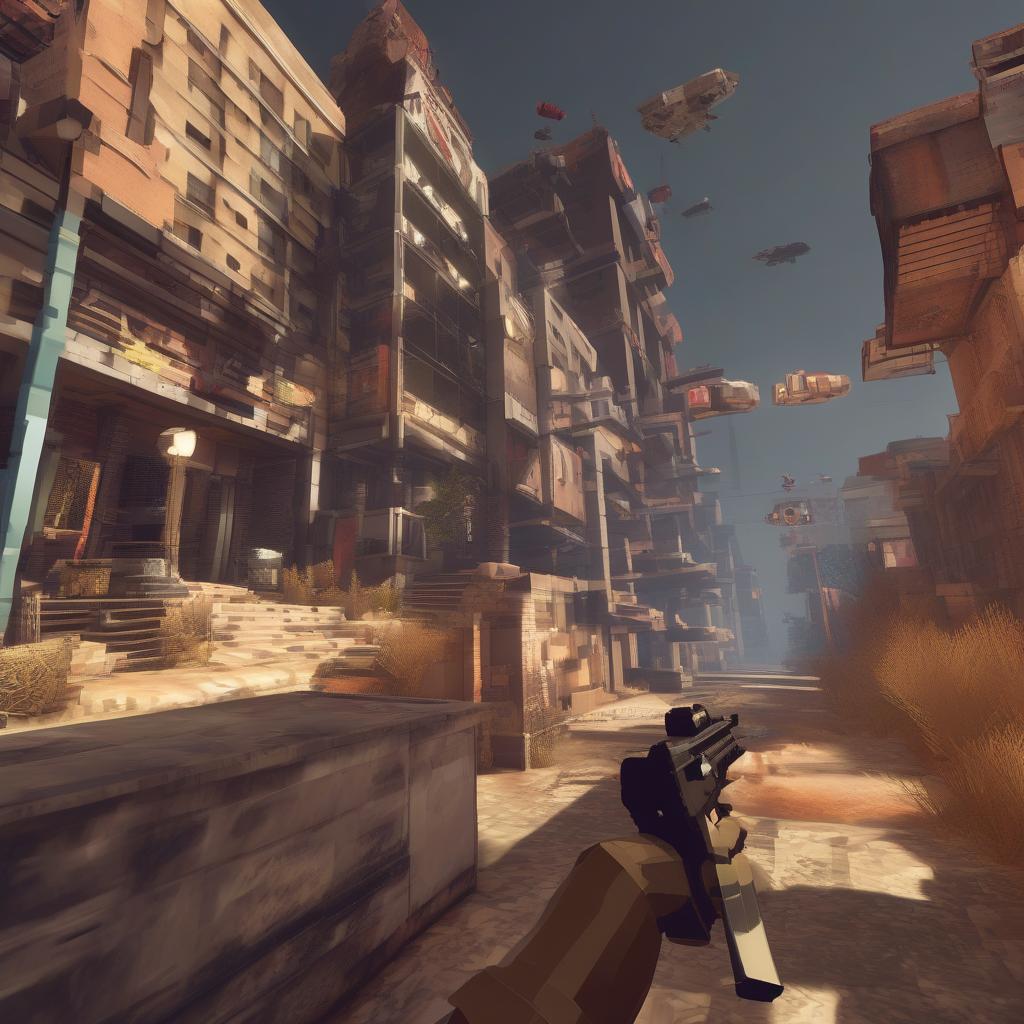First-person shooters, or FPS for short, have been a cornerstone in the gaming world for decades. I remember my first experience, clunky controls and all, exploring virtual landscapes with wide-eyed wonder. These games have evolved—they’ve become so immersive. You feel like you’re in the game, you know? You’re there with a pulse rifle, or maybe it’s a magical bow, darting through corridors or open fields. And it’s not just about shooting anymore; strategy, storytelling, and stunning graphics play huge roles now.
The Evolution of FPS Games
FPS games have come a long way since the early days of pixilated graphics and limited motion. Early classics like Doom and Wolfenstein 3D set the foundation, giving players a taste of the action-packed future. These games felt revolutionary, and I guess they were, in a sense. Here’s more on the genre’s history. Over the years, technological advances have turned these games into something almost cinematic. I mean, just look at any of the modern titles—mind-blowing graphics and complex storylines that often rival blockbuster movies.
Key Features That Define FPS Games
So, what makes a game an FPS? Essentially, it’s the perspective; you see through the eyes of the protagonist. You’re them. And then there’s the shooting, of course, but it’s more than that. It’s the immersion and the mechanics. The speed, agility, and even decision-making. Some games throw you into vast open worlds, others into tightly controlled environments. Both have their charm, right?
Graphics and Realism
Graphics have seen dramatic improvements. Modern FPS games often feature hyper-realistic environments. The textures, lighting, and shadows—it’s like walking through a painting. It’s not just eye candy, though. Realism significantly impacts gameplay, making the experience more engaging. The more believable the world, the more you want to dive into it.
Artificial Intelligence
And then there’s AI—sometimes it feels like NPCs are getting smarter. They adapt, making the game more challenging. A good AI can make or break a game. It’s frustrating when enemies just walk into your line of fire like lemmings. But when they flank you or react to your moves, that’s when it gets intense.
Why We Love FPS Games
There’s something inherently exciting about FPS games. The adrenaline rush, maybe? The challenge of beating a level or finally taking down a tough boss. It’s not just about violence or chaos; it’s about skill and strategy. For many, it’s also a social activity. Online multiplayer modes let you connect with friends and strangers. You either work as a team or go head-to-head.
Multiplayer and Online Communities
Online multiplayer has transformed the FPS landscape. Games like Call of Duty and Counter-Strike have massive followings. They’re not just games; they’re social platforms. People build friendships, sometimes even rivalries. And, well, the sense of community can be pretty amazing.
But it’s not all sunshine and rainbows. There’s the issue of toxic behavior, something many gaming communities are trying to tackle. Discussions are ongoing, and some developers are implementing systems to reduce harassment and promote a more inclusive environment. Check this out for some insight on online gaming communities. It’s good to see changes being made, but there’s still a way to go.
Types of FPS Games
Not all FPS games are created equal. They come in various styles and themes. From sci-fi and fantasy to military and horror. Each has its own unique flavor.
- Military Shooters: Think Battlefield or Call of Duty. These focus on realism and tactics.
- Sci-Fi and Fantasy Shooters: Games like Halo and Destiny take you to other worlds, offering a mix of futuristic tech and mystical elements.
- Horror FPS: If you’re into scares, Resident Evil and Left 4 Dead might be your thing.
- Indie and Experimental: These often break the mold, introducing unique mechanics or storytelling techniques.
Diversity in Gameplay
Variety in FPS games is astounding. Whether you prefer stealthily picking off enemies or going full Rambo, there’s something for you. And let’s not forget VR technology, which adds another layer of immersion to the experience.
The Impact of FPS Games on Culture
The influence of FPS games extends beyond just gamers. They’ve impacted pop culture, film, and even music. Think about all the game-inspired movies, soundtracks, and even fashion trends. They’ve become a part of our cultural fabric.
The Role of FPS in Esports
Esports has grown exponentially, and FPS games are a huge part of that. Watching professional players is almost like watching a sport. The skills, the strategies—they’re fascinating. Tournaments draw massive audiences, and players become celebrities in their own right.
| Popular FPS Esports Titles | Major Tournaments |
|---|---|
| Counter-Strike: Global Offensive | ESL Pro League |
| Call of Duty | Call of Duty League |
| Overwatch | Overwatch League |
FPS and Controversies
Can’t ignore the controversies surrounding FPS games. They’ve been under fire for promoting violence. Studies and debates are ongoing. Some claim a link, others say there’s no clear evidence. It’s a touchy subject. But what’s undeniable is the age-rating system, guiding parents and players on suitable content. Something to be mindful of, especially for younger audiences.
By the way, if you’re curious about how companies handle sensitive information, you might want to delve into their privacy policies. Here’s one I found informative: Privacy Policy.
FAQs About FPS Games
- Is playing FPS games really that addictive?
Well, they can be. The fast-paced action and constant rewards are designed to keep you hooked for hours. - Do FPS games only appeal to a certain type of gamer?
Not really. These games have such diversity now, they attract a broad audience, from casual to hardcore gamers. - Are there any good FPS games for beginners?
Yeah, absolutely. Games like Overwatch and Team Fortress 2 offer fun, accessible experiences. - What makes FPS games different from other video games?
It’s all about perspective and pace. You’re seeing the world through the character’s eyes, and it’s often very fast-paced. - Do FPS games support cross-platform play?
Many do now. It’s becoming more common, allowing friends on different systems to play together.
So, there you have it. A rambling, yet genuine dive into the world of FPS games. They’ve come a long way, haven’t they? From those blocky beginnings to the immersive, complex experiences we have today. Whether you’re a veteran player or a curious newcomer, there’s always something to discover in the FPS universe. Happy gaming!

